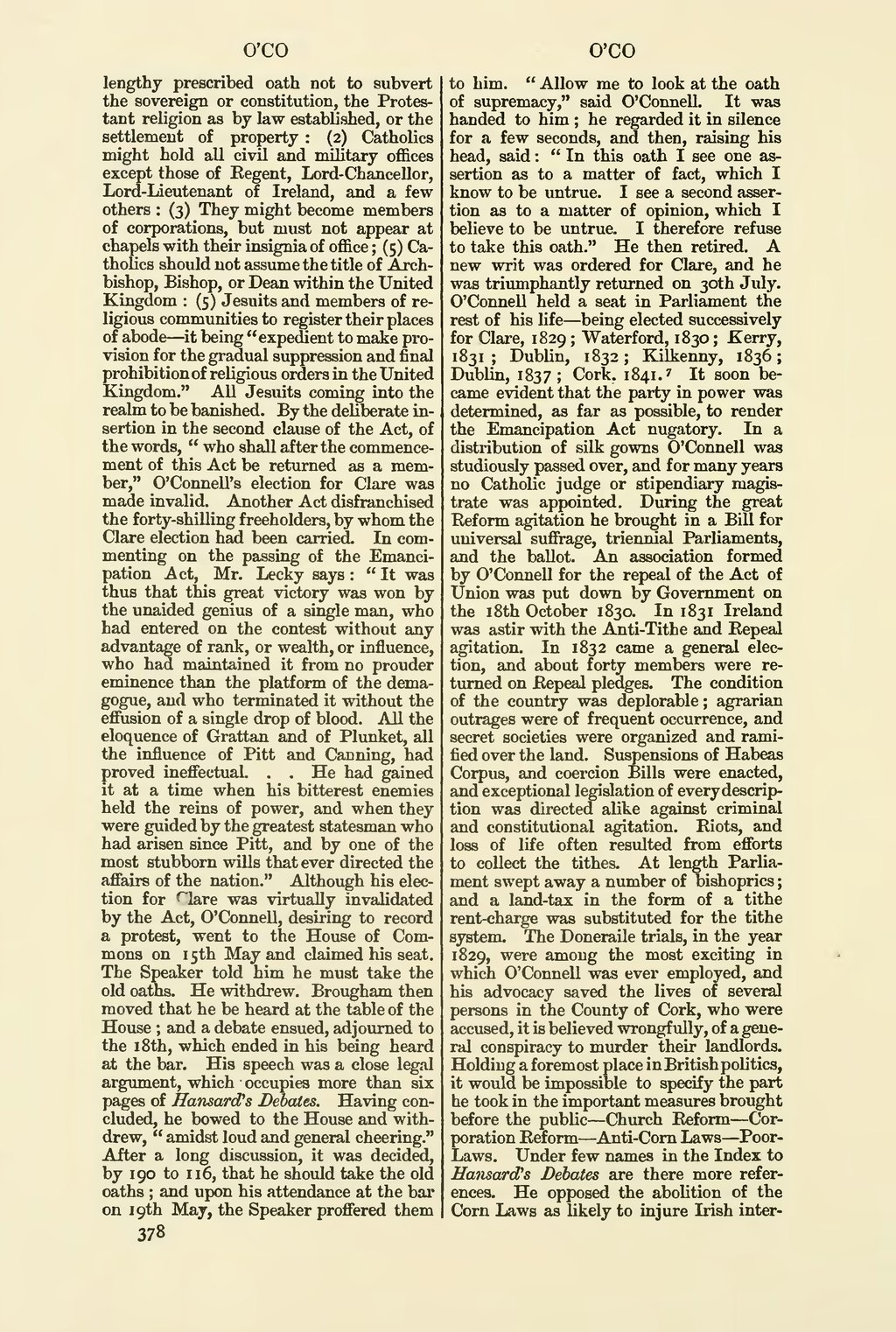lengthy prescribed oath not to subvert the sovereign or constitution, the Protestant religion as by law established, or the settlement of property: (2) Catholics might hold all civil and military offices except those of Regent, Lord- Chancellor, Lord-Lieutenant of Ireland, and a few others: (3) They might become members of corporations, but must not appear at chapels with their insignia of office; (5) Catholics should not assume the title of Archbishop, Bishop, or Dean within the United Kingdom: (5) Jesuits and members of religious communities to register their places of abode—it being "expedient to make provision for the gradual suppression and final prohibition of religious orders in the United Kingdom." All Jesuits coming into the realm to be banished. By the deliberate insertion in the second clause of the Act, of the words, "who shall after the commencement of this Act be returned as a member," O'Connell's election for Clare was made invalid. Another Act disfranchised the forty-shilling freeholders, by whom the Clare election had been carried. In commenting on the passing of the Emancipation Act, Mr. Lecky says: "It was thus that this great victory was won by the unaided genius of a single man, who had entered on the contest without any advantage of rank, or wealth, or influence, who had maintained it from no prouder eminence than the platform of the demagogue, and who terminated it without the effusion of a single drop of blood. All the eloquence of Grattan and of Plunket, all the influence of Pitt and Canning, had proved ineffectual… He had gained it at a time when his bitterest enemies held the reins of power, and when they were guided by the greatest statesman who had arisen since Pitt, and by one of the most stubborn wills that ever directed the affairs of the nation." Although his election for Hare was virtually invalidated by the Act, O'Connell, desiring to record a protest, went to the House of Commons on 15th May and claimed his seat. The Speaker told him he must take the old oaths. He withdrew. Brougham then moved that he be heard at the table of the House; and a debate ensued, adjourned to the 18th, which ended in his being heard at the bar. His speech was a close legal argument, which occupies more than six pages of Hansard's Debates. Having concluded, he bowed to the House and withdrew, "amidst loud and general cheering." After a long discussion, it was decided, by 190 to 116, that he should take the old oaths; and upon his attendance at the bar on 19th May, the Speaker proffered them to him. "Allow me to look at the oath of supremacy," said O'Connell. It was handed to him; he regarded it in silence for a few seconds, and then, raising his head, said: "In this oath I see one assertion as to a matter of fact, which I know to be untrue. I see a second assertion as to a matter of opinion, which I believe to be untrue. I therefore refuse to take this oath." He then retired. A new writ was ordered for Clare, and he was triumphantly returned on 30th July. O'Connell held a seat in Parliament the rest of his life—being elected successively for Clare, 1829; Waterford, 1830; Kerry, 1831; Dublin, 1832; Kilkenny, 1836; Dublin, 1837; Cork. 1841.7 It soon became evident that the party in power was determined, as far as possible, to render the Emancipation Act nugatory. In a distribution of silk gowns O'Connell was studiously passed over, and for many years no Catholic judge or stipendiary magistrate was appointed. During the great Reform agitation he brought in a Bill for universal suffrage, triennial Parliaments, and the ballot. An association formed by O'Connell for the repeal of the Act of Union was put down by Government on the 18th October 1830. In 1831 Ireland was astir with the Anti-Tithe and Repeal agitation. In 1832 came a general election, and about forty members were returned on Repeal pledges. The condition of the country was deplorable; agrarian outrages were of frequent occurrence, and secret societies were organized and ramified over the land. Suspensions of Habeas Corpus, and coercion Bills were enacted, and exceptional legislation of every description was directed alike against criminal and constitutional agitation. Riots, and loss of life often resulted from efforts to collect the tithes. At length Parliament swept away a number of bishoprics; and a land-tax in the form of a tithe rent-charge was substituted for the tithe system. The Doneraile trials, in the year 1829, were among the most exciting in which O'Connell was ever employed, and his advocacy saved the lives of several persons in the County of Cork, who were accused, it is believed wrongfully, of a general conspiracy to murder their landlords. Holding a foremost place in British politics, it would be impossible to specify the part he took in the important measures brought before the public—Church Reform—Corporation Reform—Anti-Corn Laws—Poor-Laws. Under few names in the Index to Hansard's Debates are there more references. He opposed the abolition of the Corn Laws as likely to injure Irish inter- 378
